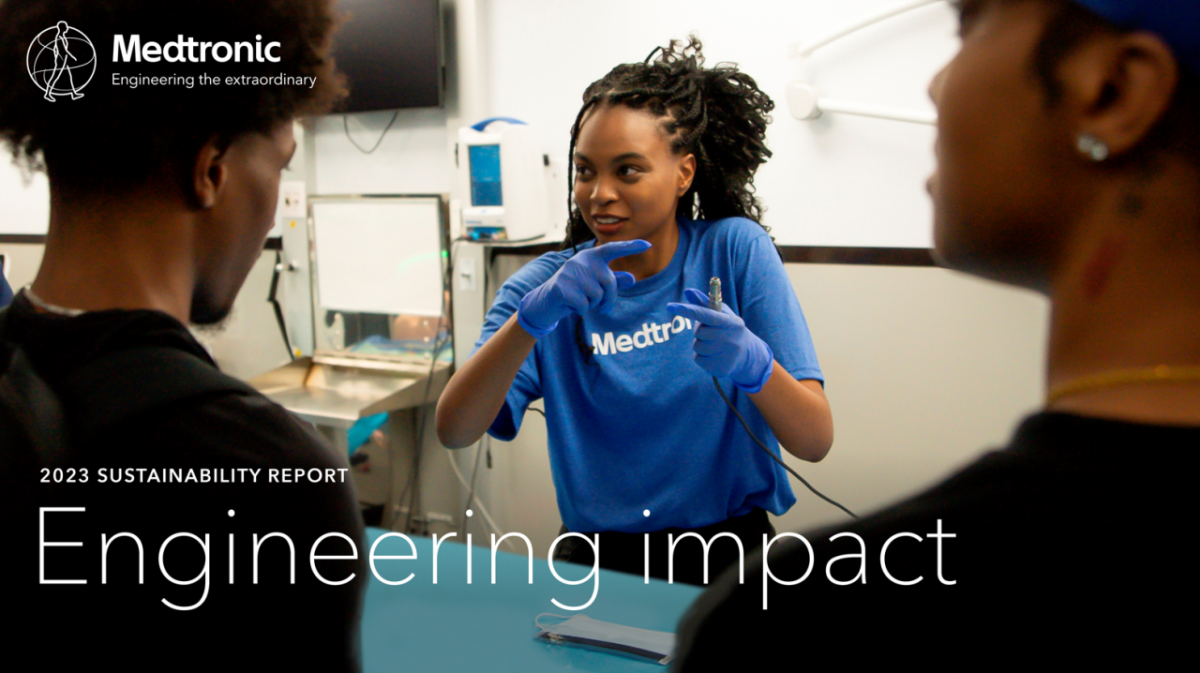Transparency, Accountability, Commitment: Three Non-Negotiables for Responsible Business
Executives are faced with a tremendous obligation – to employees, communities, and shareholders – and an unparalleled opportunity.

Torod B. Neptune, Senior Vice President and Chief Communications Officer, Medtronic
Businesses face rapidly growing, and often contradictory, expectations regarding their role in society. Alongside calls to do more to address deeply rooted societal issues are opposing voices telling companies to “stay in their lane.” Without clear values as a guide, brands find themselves at an impasse, unsure if they should stay the course or take the next exit.
We can debate if these expectations are fair. In most cases, I’d argue they are. Business wields indisputable power to improve circumstances for people and our planet while making a fair profit. At Medtronic we talk about these responsibilities openly, from our Mission written 60 years ago, to our sustainability report published today. (You can read highlights here.)
Expectations won’t diminish anytime soon, and it’s not just external stakeholders applying pressure. A Glassdoor study of job seekers found 86% “would not consider working for a company with bad social standing.” An Edelman survey of more than 200 Fortune 500 and Forbes Global 1000 Chief Communications Officers revealed employees are “putting the most pressure on companies to act on social issues” (61%); ahead of regulators, investors, and NGOs.
Navigating these divergent expectations is no small challenge. Executives are faced with a tremendous obligation – to employees, communities, and shareholders – and an unparalleled opportunity. How can leaders chart a path forward? Transparency, accountability, and commitment – what I consider the three non-negotiables of responsible business.
Transparency
The era where any company can simply call itself responsible is behind us — today, business must prove it. Unfortunately, economic anxiety, disinformation, and increased polarization have eroded trust in institutions, and left people feeling vulnerable. As a result, brands are facing increased scrutiny, and the need to build trust is more urgent. Per a special report from Edelman, 71% percent of consumers say, “it is more important to trust the brands I buy or use today than in the past.”
At its core, transparency is about building trust. It’s being open and honest, telling people what they can expect, and how your business is upholding its promises. Transparency is easy when the news is good, but even more important when a business falls short. In those honest moments businesses can build trust and even attract new partners and allies who understand goals most worthy of our time and effort are often the hardest to accomplish.
This is one reason Medtronic publishes an annual sustainability report and annual inclusion, diversity, and equity report. Through these reports and other channels, we share stories, document our progress, and acknowledge where we need to do more.
Accountability
Transparency means more when tied to clear goals. Perhaps you’ve heard “measure what matters” or read John Doerr’s book of the same title. Setting clear targets sends a signal about what matters to a company and provides a framework to publicly hold businesses accountable.
This is simply good business. Research shows consumers are more likely to buy from brands that commit to taking actions like improving access to healthcare (7 times more likely), addressing climate change (5 times more likely), and ending racism (4.5 times more likely). But consumers also want action.
Aligning with leading reporting frameworks and standards, including the Global Reporting Initiative (GRI) and Science Based Targets initiative (SBTi) helps us demonstrate accountability for our impact and share it with our stakeholders. Medtronic also ties our business operations to the United Nation’s Sustainable Development Goals, recognizing the collective power of the private and public sectors to address the world’s greatest challenges.
Commitment
In recent years, business has faced criticism for talking too much and not doing enough, on societal issues ranging from racial justice to climate change and income inequality. These are deeply rooted, systemic issues that have been compounding for centuries. Meaningful progress will take years and is possible only through collective action.
This doesn’t excuse business from inaction. I can’t think of a single brand that can’t have a positive impact by being conscious of how it conducts its day-to-day business. A responsible business recognizes its power and influence – and uses both accordingly.
Medtronic has built our commitments into how we operate. We’re doing business with diverse suppliers that reflect the communities we serve, which in turn bolsters their business and local economies. We’re leveraging our expertise in healthcare technology to improve healthcare access for underserved communities around the world – including significant investments in Medtronic LABS. And, recognizing innovation is only possible with a diverse and engaged workforce, we’re ensuring our hiring and other workforce practices reflect that.
Change is constant, and expectations of companies continue to evolve. I believe that’s a good thing — for our brands and all our stakeholders. There will likely be rough waters as business continues to navigate its role, but staying focused on transparency, accountability, and commitment will help all of us chart a path forward.
Follow Torod Neptune on LinkedIn for additional insights and commentary: https://www.linkedin.com/in/torodneptune/

